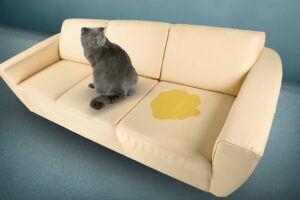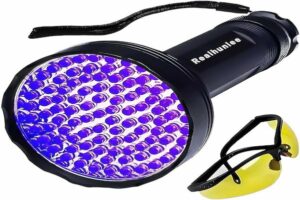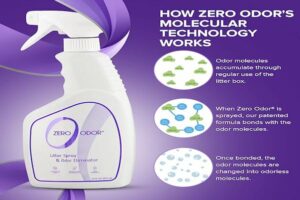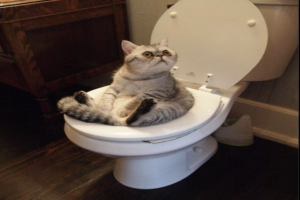 This is a smelly topic, but we need to talk about cat urine and enzyme cleaners. Your cat’s super-sensitive nose – knows where the urine is so if he has gone outside the box before, he will be drawn back to that spot again and again! The ASPCA estimates that up to 10% of cats will urinate outside the litter box at least at some point in their lives.* And any pet parent will tell you, urine is smelly! It’s also a leading cause of rehoming or surrendering cats in the USA.
This is a smelly topic, but we need to talk about cat urine and enzyme cleaners. Your cat’s super-sensitive nose – knows where the urine is so if he has gone outside the box before, he will be drawn back to that spot again and again! The ASPCA estimates that up to 10% of cats will urinate outside the litter box at least at some point in their lives.* And any pet parent will tell you, urine is smelly! It’s also a leading cause of rehoming or surrendering cats in the USA.
An enzyme cleaner for cat urine isn’t a cleaning agent, instead, it’s made up of millions of live bacteria, hungry bacteria, that contain a catalyst called a protease enzyme and that enzyme wants to have a party on your cat’s urine and transform that urine into inert, odor-free substances. It’s kind of like Pac-Man eating his way through the maze of dots!
The reason it’s good for urine removal is if you just use a cleaning agent you’re trying to wipe away the urine, but you will invariably leave enough urine molecules behind to bring your cat back to the scene of the crime. Enzyme cleaners effectively eat the urine and when used properly leave nothing behind. To be absolutely certain you’re getting rid of every bit of urine, and not just for your nose, but for your cat’s nose too, you need a simple blacklight flashlight  that detects stains. If you see glowing white spots then there is still enough urine residue to be smelled by your cat. To prevent him from being a serial re-offender you have to dig deep and enzyme-clean again.
that detects stains. If you see glowing white spots then there is still enough urine residue to be smelled by your cat. To prevent him from being a serial re-offender you have to dig deep and enzyme-clean again.
Precautions include generally testing fabric before deep application, and following the manufacturer’s instructions closely. If you use cleaning agents first, make sure you rinse well as some cleaners will inactivate the enzymes, or better yet, clean with detergents after using the enzyme cleaner (and detecting with the blacklight).
The biggest consideration when buying an enzyme cleaner is that you want one specifically formulated for cat urine, and then you should decide if you want a scented or unscented product. Some including MisterMax Anti Icky Poo  also have a pretreatment product and a separate stain remover in addition to their enzyme products. Nature’s Miracle is another well-known brand although some people object to the smell of it. Enzyme cleaners work on fabrics, clothing, and hard surfaces.
also have a pretreatment product and a separate stain remover in addition to their enzyme products. Nature’s Miracle is another well-known brand although some people object to the smell of it. Enzyme cleaners work on fabrics, clothing, and hard surfaces.
Tips include: Spray liberally. And you should let it air dry, not wipe the enzyme liquid away because it is the act of drying that allows the enzymes to do their job.
On a related topic, if your litter box is smelly you’re obviously not going to want to use an enzyme cleaner on it. Instead, you can use a different type of product, a molecular blocker of scent. My favorite is Zero Odor, and for all sorts of different applications see the company website at zeroodor.com. These products are amazing and lock onto odor like a trap.
For your cat, urine is his Eau de toilette and we don’t want him depositing it around your home! Half the battle to get your cat to consistently use the litter box is the complete removal of urine stains that are outside the box. For the rest of that battle schedule a consultation with me and I will guide you to success. Also please see and fill out my litter box questionnaire. It helps reveal the various causes of inappropriate elimination that can be stress-induced, the result of separation anxiety, medical causes, territorial issues, litter box and/or substrate (litter) dissatisfaction, spraying, and more.
litter box questionnaire. It helps reveal the various causes of inappropriate elimination that can be stress-induced, the result of separation anxiety, medical causes, territorial issues, litter box and/or substrate (litter) dissatisfaction, spraying, and more.
* https://www.aspca.org/pet-care/cat-care/common-cat-behavior-issues/urine-marking-cats

By Stephen Quandt
Copyright © Stephen Quandt, 2023, All Rights Reserved | Email: [email protected] | Instagram: @CatBehaviorHelp
